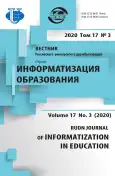ICT competence formation model of a future primary school teacher
- 作者: Beshenkov S.A.1, Matveeva V.A.2
-
隶属关系:
- Institute for Education Management of the Russian Academy of Education
- Sakhalin State University
- 期: 卷 17, 编号 3 (2020)
- 页面: 190-200
- 栏目: COMPUTER SCIENCE TEACHING
- URL: https://journal-vniispk.ru/2312-8631/article/view/321247
- DOI: https://doi.org/10.22363/2312-8631-2020-17-3-190-200
- ID: 321247
如何引用文章
全文:
详细
Problem and purpose. The article is devoted to the problem of the formation of ICT competence in future primary school teachers. In the context of global mass communication, the most valuable resource today is the ability to analyze, systematize, and interpret information. Global informatization naturally affects the education process and the main task of the education system is to identify current trends in the development of society and introduce pedagogical technologies into the educational process that form positive experience and reflect modern social changes, leading the educational process into an ordered, controlled system. The aim of the study is to find effective ways of manifesting information activities, building a model that promotes the development of ICT competence in future primary school teachers by means of mathematical cycle disciplines. Methodology. During the study, an analysis of approaches to the creation of educational models was carried out, ways of developing ICT competence of future primary school teachers by means of mathematical cycle disciplines were revealed. The main conceptual idea of the model, contributing to the solution of the didactic problems (epistemological, axiological, praxeological, professional-personal, communicative), is the reflection of mathematics in the information field as an instrument of humanization of the modern information society and personality. The basic aspects of fragmented subject modeling of pedagogical reality is the application of an integrated approach to the conceptual, criteria and quantification of the model. Results. A model for the development of ICT competence of future primary school teachers has been developed. The technological component of the model is disclosed, the criterion component of which is represented by the matrix of conjugation of levels (elementary, sufficient, advanced) and components of ICT competency (epistemological, axiological, praxiological, professional-personal, communicative). Each component is revealed through the prism of knowledge, skills and experience. Conclusion. The developed model for the development of ICT competence of future primary school teachers by means of the mathematical cycle disciplines justifies itself in practice and needs further research and quantitative analysis.
作者简介
Sergey Beshenkov
Institute for Education Management of the Russian Academy of Education
编辑信件的主要联系方式.
Email: srg57@mail.ru
doctor of pedagogical sciences, professor of the Russian Academy of Education, head of the laboratory of informatics training and chief researcher at the Institute
16 Zhukovskogo St, Moscow, 105062, Russian FederationValentina Matveeva
Sakhalin State University
Email: matveeva89.ru@mail.ru
senior lecturer of the department of mathematics
68 Pogranichnaya St, Yuzhno-Sakhalinsk, 693008, Russian Federation参考
- Koncepciya razvitiya rossijskogo matematicheskogo obrazovaniya [The concept of development of Russian mathematical education]. Available from: http://www.garant.ru/ products/ipo/prime/doc/70452506/ (accessed: 18.03.2020).
- Grinshkun VV, Remorenko IM. Frontiry “Moskovskoj elektronnoj shkoly” [Frontiers of the Moscow Electronic School]. Informatika i obrazovanie [Informatics and education]. 2017;7(286):3–8.
- Beshenkov SA, Rakitina EA, Mindzaeva EV. Informacionnoe obrazovanie v Rossii [Information Education in Russia]. Znanie. Ponimanie. Umenie [Knowledge. Understanding. Skill]. 2013;(3):42–51.
- Viktorova YuV. Formirovanie IKT-kompetentnosti uchashchihsya 9-h klassov v processe obucheniya matematike [Formation of ICT competence of 9th grade students in the process of teaching mathematics]. Dissertation of the Candidate of Pedagogical Sciences. Ekaterinburg; 2016.
- Bespalko VP. Slagaemye pedagogicheskoj tekhnologii [Components of educational technology]. Moscow: Pedagogika Publ.; 1989.
- Dahin AN. Pedagogicheskoe modelirovanie: sushchnost', effektivnost' i.. neopredelennost' [Pedagogical modeling: essence, efficiency and.. uncertainty]. Available from: https://prepod.nspu.ru/mod/page/view.php?id=12172 (accessed: 18.03.2020).
- Dahin AN. Modelirovanie v pedagogike [Modeling in pedagogy]. Idei i idealy [Ideas and ideals]. 2010;1(3):11–20.
- Miheev VI. Modelirovanie i metody teorii izmerenij v pedagogike [Modeling and methods of measurement theory in pedagogy]: scientific and methodological guide. Moscow: Vysshaya shkola Publ.; 1987.
- Novikov AM. Nauchno-eksperimental'naya rabota v obrazovatel'nom uchrezhdenii. Delovye sovety [Scientific and experimental work in an educational institution. Business advice]. Moscow: Associaciya “Professional'noe obrazovanie” Publ.; 1998.
- Pejpert S. Perevorot v soznanii: deti, komp'yutery i plodotvornye idei [Coup in Consciousness: Children, Computers, and Fruitful Ideas]. Moscow: Pedagogika Publ.; 1989.
- Suhodol'skij GV. Strukturno-algoritmicheskij analiz i sintez deyatel'nosti [Structural and algorithmic analysis and synthesis of activities]. Leningrad: LGU Publ.; 1976.
- Buhvalov VA. Metodiki i tekhnologii obrazovaniya [Methods and technologies of education]. Riga; 1994.
- Shatalov VF. Pedagogicheskaya proza [Educational prose]. Arhangel'sk: Severo-Zapadnoe knizhnoe izdatel'stvo Publ.; 1990.
- Holina LI, Abaskalova NP, Dahin AN. Modelirovanie i neopredelyonnost' pedagogicheskih rezul'tatov [Modeling and uncertainty of pedagogical results]. Vestnik Novosibirskogo gosudarstvennogo pedagogicheskogo universiteta [Bulletin of the Novosibirsk State Pedagogical University]. 2015;6(28):101–110.
- Grinshkun VV. Osobennosti podgotovki pedagogov v oblasti informatizacii obrazovaniya [Features of the training of teachers in the field of education informatization]. Informatika i obrazovanie [Informatics and education]. 2011;(5):68–72.
补充文件









